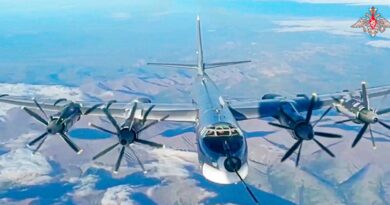Keir Starmer issues stark warning to Iran after Israel bombs Tehran | World | News
Sir Keir Starmer has urged “all sides to show restraint” when asked if he considers Israel’s air strikes on Iran to be proportionate.
Israel pounded Iran with a series of airstrikes on Saturday (October 26), saying it was targeting military sites in retaliation for the barrage of ballistic missiles the Islamic Republic fired on Israel earlier this month.
The Prime Minister said: “On the question of the strikes, I think we need to be really clear that Israel does have the right to defend itself, but we are urging, and have been urging all sides to show restraint, and that’s why I’m very clear today, Iran should not be responding to this.
“And those are really important messages of de-escalation that, at this moment in time, I think it’s very important everybody needs to heed.”
Iran should not respond to Israeli strikes, Sir Keir Starmer said.
Speaking at a press conference in Samoa, the Prime Minister added: “I am clear that Israel has the right to defend itself against Iranian aggression, and I am equally clear that we need to avoid further regional escalation and urge all sides to show restraint.
“Iran should not respond. We will continue to work with allies to de-escalate the situation across the region.”
A Downing Street spokesman said: “We are monitoring this situation closely. We support Israel’s right to self-defence and to protect itself in line with international humanitarian law. Further escalation is in no one’s interest.”
Explosions were heard in the Iranian capital, Tehran, during the attacks, though the Islamic Republic insisted the damage was “limited”.
The attack risks pushing the two countries closer to an all-out war at a time of spiralling violence across the Middle East, where militant groups backed by Iran — including Hamas in Gaza and Hezbollah in Lebanon — are already at war with Israel.
Saturday marked the first time Israel‘s military has openly attacked Iran, which hasn’t faced a sustained barrage of fire from a foreign enemy since its war with Iraq in the 1980s.
Israel‘s hours-long attack ended just before sunrise in Tehran, with the Israeli military saying it targeted “missile manufacturing facilities used to produce the missiles that Iran fired at the state of Israel over the last year”. It also said it hit surface-to-air missile sites and “additional Iranian aerial capabilities”.
Initially, nuclear facilities and oil installations had been considered as possible targets for Israel’s response to Iran’s October 1 attack.
However, in mid-October, US President Joe Biden‘s administration gained assurances from Tel Aviv that it would not hit such targets, which would have been a more severe escalation.
Israeli military spokesperson Rear Admiral Daniel Hagari said in a prerecorded video statement on Saturday: “The regime in Iran and its proxies in the region have been relentlessly attacking Israel since October 7, including direct attacks from Iranian soil.
“Like every other sovereign country in the world, the state of Israel has the right and the duty to respond.”
Iran’s military said the strikes targeted military bases in Ilam, Khuzestan and Tehran provinces.
Britain’s position echoes that of the United States, with Washington also warning against further retaliation, indicating the overnight strikes should end the direct exchange of fire between Israel and Iran.
Iran’s state-run media acknowledged that blasts could be heard in Tehran, adding that some of the noises came from air defence systems around the city.
But beyond a brief reference, Iranian state television for hours offered no other details and even began showing what it described as live footage of men loading trucks at a vegetable market in Tehran in an apparent attempt to downplay the assault.
A Tehran resident told The Associated Press at least seven explosions could be heard in the first wave of attacks, which rattled the surrounding area. The resident spoke on anonymity for fear of reprisals.
As explosions sounded, people in Tehran could see what appeared to be tracer fire light up the sky. Other footage showed the launch of what appeared to be surface-to-air missiles.
Iran closed its airspace earlier on Saturday. AP-analyzed flight-tracking data showed that commercial airlines had generally left the skies over Iran, Iraq, Syria, and Lebanon.





